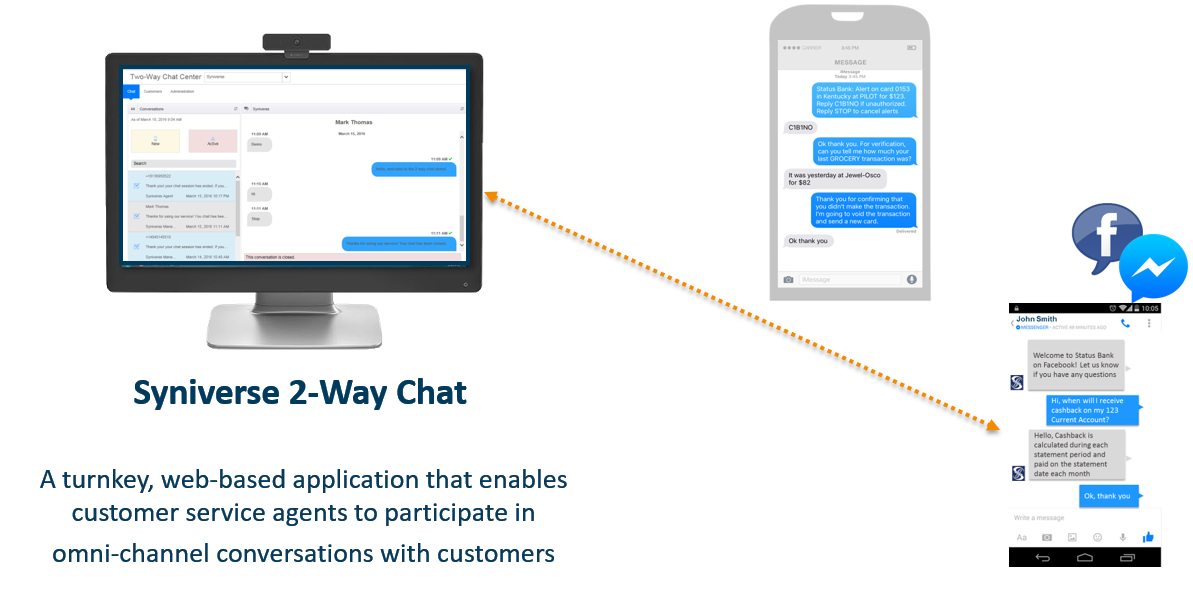Two-Way Chat Overview
Overview
Syniverse Two-way Chat service enables companies to send and receive messages, and conduct chats with its end-users via a CRM application or cross-channel call center application. The service aggregates messages received from multiple channels (SMS, MMS, and OTT messaging channels such as Facebook Messenger) into a single user interface for easy viewing. Companies are increasingly looking for ways to quickly respond to end-user inquiries to improve satisfaction and enhance service quality. With more than 90% mobile device penetration and the shift to mobile as the primary communication channel of choice; companies are looking for mobile customer support solutions that enable real-time, 2-way dialogue with its end-users.
The end-user can initiate a chat, and the company's employees/agents can respond to the end-user. Agents can also initiate a chat, or a company's system can automatically send a message to start a chat session. Agents can respond to any chat or can be assigned chats to respond to.
Service Description
Syniverse 2-Way Chat Service is a web-based GUI application that allows Syniverse Customer (“Clients”) to engage in bi-directional messaging using SMS chat sessions with its customers. What is a Chat? A chat is a series of a messages to/from a single end-user that is designated by a start and an end. Typically, a chat is initiated by an end-user (can also be started by sending a message to an end-user), and a chat is ended by an agent, due to inactivity, or when end-user opts-out by sending a STOP message.
Whether you are a small Business with a CRM application, an Individual Developer developing a User Interface with CRM capabilities, or an Enterprise with a Call Center application, the Syniverse Two-way Chat service provides a simple and easy to use User Interface for you to integrate and configure conversational functionality into your own application.
The Syniverse Two-way Chat service supports the concept of departments within the chat service. For example, an end-user can chat with the "global customer service department" to ask general questions, and then ask a question from the "technical support" department, and even have a chat with the "telesales" department regarding a recent purchase order.The Customers uses a keyword to initiate a conversation over a SMS-capable Sender address like a Shortcode, Longcode or Toll-free number assigned and provisioned for the Clients. Where applicable and available, a Sender address with Facebook Messenger or WhatsApp business messaging may also be used.

Use Cases
- Send order confirmations, shipping status updates, payment reminders
- Provide customer support for billing issues, technical support, and business hours
- Enable Conversations with a chatbot for frequently asked questions, payment due dates, and account status updates, and handoff/transfer to a live agent
- Support hotel requests such as room service ordering, car service booking, and dining and spa reservations
- Schedule appointments (doctors, salon, restaurant, etc).
Key Features
End-User Consent Management:
- Built-in Consent Management: End-users can opt-in by sending a message to start a chat and opt-out by sending a STOP message to end a chat
User Management:
- Three types of users are supported. The manager accounts can be used to setup while the agent accounts can be used to send and receive messages.
- Agent: Agent's have access to a specific property/department and generally have the lowest level of access
- Property Manager: can administer a specific property/department and can perform the functions of an agent as well.
- Global Manager: can administer the whole site, including all properties/departments and all property managers and agent and can perform the functions of a property manager and an agent.
Agent Management:
- Agent Tracking: Agent's name is recorded alongside message for response tracking
- Agent Collision Detection: User interface will block multiple agent responses to the same end-user message to prevent collision. The Two-Way Chat service will send an event indicating that another agent is responding.
- Agent Assignment: Assign chat session to agents in round-robin fashion
- Transfer: Transfer a chat session from one department to another
Message Keyword Management
- Keyword Messages: Configure response messages for STOP and HELP keywords via the user interface
- Keyword-Based Routing: Enable end-users to chat directly with a specific department. For example, when a chat is initiated without a keyword, it can be routed to the primary department (i.e. customer support), while a chat initiated with a keyword can be routed to another department (i.e. technical support).
Message Template Management
- Canned Response Templates: Quickly send messages by using a pre-defined response template (drag and drop functionality in user interface)
- Automated Messages: Configure a welcome, good-bye or error message via the user interface
- Business Hours: Configure response for business days/hours and holidays of operation. An automatic response will be sent in lieu of a welcome message.
Alerts and Reporting
- Online Alerts: Enable audible and visual alerts when a new message arrives from an end-user
- Offline Alerts: Trigger an email alert if an end-user message is received when the agent is offline. Inactivity time periods and email recipients can be defined within the user interface
- Reporting:View and export chat session history from the user interface
Access
To sign up for access to the Two-Way Chat service offering, log in to https://developer.syniverse.com or contact Syniverse Sales . Once registered, customers can access the chat service user interface at https://chat.syniverse.com/ (Note: customer login link will be in the form chat.syniverse.com/<your-business-name> and will be emailed after setup).
Related Service
- SMS API Service: Supports personalizing messages, sending and receiving messages with different content types, recognizing and tracking threads of conversations and conversion events, and providing a higher level of analytical information on communication events.
- Social Messaging API Service: Supports personalizing messages, and sending and receiving messages to and from end-users utilizing Facebook Messenger